 “I get outa that bed every day, see? I make a good salary and my horn still sounds good. And I feel good. So I don’t think nobody in the world any richer than I am. Musicians don’t retire. They stop when there’s no more work. We never thought about that in New Orleans. Like we say there, ‘That our hustle,’ you know, a day’s work. But anybody sit down with their money and look at the four walls, they don’t live long; they die. There’s nothin’ I can say other than I’ve set myself up to be a happy man. And—I made it.”
“I get outa that bed every day, see? I make a good salary and my horn still sounds good. And I feel good. So I don’t think nobody in the world any richer than I am. Musicians don’t retire. They stop when there’s no more work. We never thought about that in New Orleans. Like we say there, ‘That our hustle,’ you know, a day’s work. But anybody sit down with their money and look at the four walls, they don’t live long; they die. There’s nothin’ I can say other than I’ve set myself up to be a happy man. And—I made it.”
Louis Armstrong (quoted in Ricky Riccardi, What a Wonderful World: The Magic of Louis Armstrong’s Later Years)


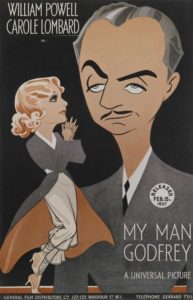 Mrs. T and I opted last Monday to watch a William Powell comedy, My Man Godfrey, instead of subjecting ourselves to the first presidential debate. When I tweeted about our decision, these responses were immediately forthcoming from two of my followers:
Mrs. T and I opted last Monday to watch a William Powell comedy, My Man Godfrey, instead of subjecting ourselves to the first presidential debate. When I tweeted about our decision, these responses were immediately forthcoming from two of my followers: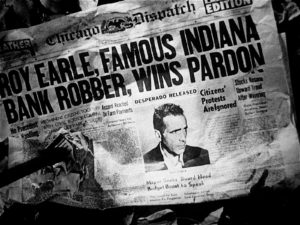 Humphrey Bogart was similarly mature, even as a young man, and his maturity is what propels High Sierra, in which he plays Roy Earle, a weary gangster with graying hair who was even older on the screen than Bogart himself was in real life. His performance is redolent of the terminal disillusion of a man who has seen the worst of Depression-era life and been permanently scarred by it. I doubt that very many of today’s American screen stars could play such a part other than ludicrously, but Bogart, who was forty-one when High Sierra was filmed, brought it off without apparent effort. To watch him in High Sierra, or Powell in My Man Godfrey, is to understand the truth of my friend’s remark. We live in a different universe now, one in which maturity is not merely undervalued but actively shunned.
Humphrey Bogart was similarly mature, even as a young man, and his maturity is what propels High Sierra, in which he plays Roy Earle, a weary gangster with graying hair who was even older on the screen than Bogart himself was in real life. His performance is redolent of the terminal disillusion of a man who has seen the worst of Depression-era life and been permanently scarred by it. I doubt that very many of today’s American screen stars could play such a part other than ludicrously, but Bogart, who was forty-one when High Sierra was filmed, brought it off without apparent effort. To watch him in High Sierra, or Powell in My Man Godfrey, is to understand the truth of my friend’s remark. We live in a different universe now, one in which maturity is not merely undervalued but actively shunned.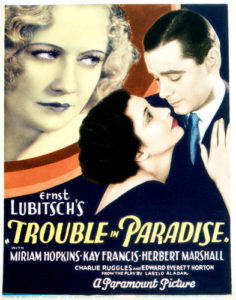 Nobody feels that way about silent films. It was the introduction of sound that opened the door to the perpetual now of the movies, in which William Powell and Humphrey Bogart seem as real to us as Ben Affleck and Leonardo DiCaprio. Within a few short years of the release of The Jazz Singer, a handful of preternaturally gifted directors, Ernst Lubitsch and Jean Renoir foremost among them, had grappled successfully with the challenge of sound and were starting to make pictures like Trouble in Paradise and La Chienne that have the snap and immediacy to which the moviegoers of the Thirties quickly became accustomed, and in which I continue to take endless delight eight decades later.
Nobody feels that way about silent films. It was the introduction of sound that opened the door to the perpetual now of the movies, in which William Powell and Humphrey Bogart seem as real to us as Ben Affleck and Leonardo DiCaprio. Within a few short years of the release of The Jazz Singer, a handful of preternaturally gifted directors, Ernst Lubitsch and Jean Renoir foremost among them, had grappled successfully with the challenge of sound and were starting to make pictures like Trouble in Paradise and La Chienne that have the snap and immediacy to which the moviegoers of the Thirties quickly became accustomed, and in which I continue to take endless delight eight decades later.
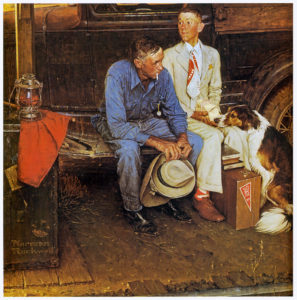 The Mosaic Theatre Company’s production of Satchmo at the Waldorf closed yesterday afternoon in Washington, D.C. It’s always bittersweet when a show comes to the end of its run, but this particular closing has a special meaning for me: it’s the first time in nearly a year that Satchmo isn’t running, in rehearsal, or in the works somewhere in America. I flew out to Chicago last December to help get Charles Newell’s Court Theatre production underway, and since then Satchmo has been performed in Chicago, San Francisco, Portsmouth, Colorado Springs, West Palm Beach, Sacramento, Washington, and Baton Rouge. I saw four of those stagings and
The Mosaic Theatre Company’s production of Satchmo at the Waldorf closed yesterday afternoon in Washington, D.C. It’s always bittersweet when a show comes to the end of its run, but this particular closing has a special meaning for me: it’s the first time in nearly a year that Satchmo isn’t running, in rehearsal, or in the works somewhere in America. I flew out to Chicago last December to help get Charles Newell’s Court Theatre production underway, and since then Satchmo has been performed in Chicago, San Francisco, Portsmouth, Colorado Springs, West Palm Beach, Sacramento, Washington, and Baton Rouge. I saw four of those stagings and 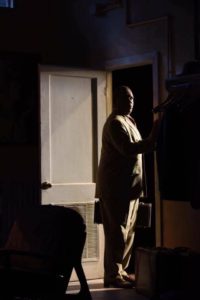 Nevertheless, I know it’s time to start frying other fish. I’m already hard at work on my second play, about which much more later, and I’ve been talking to a regional theater company about directing another play, this one written by somebody else. As for my day job at The Wall Street Journal, it’s shifted into the high gear of a brand-new season: I saw three shows in New York last week and will be reviewing them for the Journal this week and next.
Nevertheless, I know it’s time to start frying other fish. I’m already hard at work on my second play, about which much more later, and I’ve been talking to a regional theater company about directing another play, this one written by somebody else. As for my day job at The Wall Street Journal, it’s shifted into the high gear of a brand-new season: I saw three shows in New York last week and will be reviewing them for the Journal this week and next. So it is, and I’m preparing to move on to the next one, whatever and wherever it may turn out to be. But I sure have enjoyed the moment that just came to an end, as much as I’ve ever enjoyed anything in my professional life. And no matter how many more moments lay ahead of me in the years that lie ahead, I very much doubt that any of them, however exciting they are, will be quite like this one.
So it is, and I’m preparing to move on to the next one, whatever and wherever it may turn out to be. But I sure have enjoyed the moment that just came to an end, as much as I’ve ever enjoyed anything in my professional life. And no matter how many more moments lay ahead of me in the years that lie ahead, I very much doubt that any of them, however exciting they are, will be quite like this one.